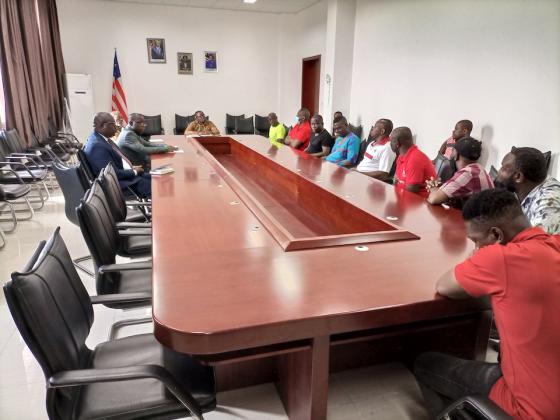Liberia: Making Away with Millions

After their businesses had been shut down and chained by Commerce Ministry inspectors, about ten alleged pirates showed up at the Minister’s office to plead for reopening.
....How Intellectual Property violators (Pirates) are fleecing creative artists in Liberia and elsewhere
The trend of intellectual property (IP) violation in Liberia may appear to have achieved a status of normalcy but, according to the Ministry of Commerce and Industry (MOCI), there is an ongoing wave of crackdowns against violators — better known as ‘pirates’ — to clear the back market and establish a structure for a regime that will see content creators finally begin to benefit from their creative works.
Two weeks ago, the MOCI began shutting down the businesses of those involved in the sale of DVDs and CDs containing local and international creative works — movies, music, and the like. Some arrests were made, especially those who resisted the closure of their businesses.
According to the Ministry Liberia is losing more than US$4 million to intellectual property violations every year, with some estimates putting it at up to about US$10 million. By virtue of such losses weighing so heavily on the economy, says Wilfred Bangura, Deputy Minister of Commerce for Administration, piracy or IP violations border on economic crimes and can carry severe penalties.
“As per the law, we have many penalties. Economic crimes or economic sabotage is a very serious crime,” Bangura told the Daily Observer in an exclusive interview. “That’s why we are working closely with the courts. The penalty can be a heavy fine or even imprisonment. It can lead to deportation if you are a foreigner or alien engaged in economic sabotage. We are determined to use the full force of the law and to exhaust every remedy given to us under the law to ensure that we structure the market so that everybody is protected — that the government gets her share, the creative artists get what belongs to them lawfully, and everybody is going to be doing fine.
“But we’re not going to have a situation wherein a lot of people survive on piracy, and piracy becomes a phenomenon and people are discouraged from venturing into creative artworks and government loses millions and millions of dollars,” Bangura said.
According to Prince Decker, Director of the Liberia Intellectual Property Office (LIPO) the “textual definition of a pirate is one who engages into unauthorized reproduction, distribution of creative contents for commercial gains. All uses of creative content without authorization, commercially, one becomes a pirate. In the context of the law, those guys, as at now, who have not obtained their copyright clearances, they are now pirates.”
But the crime is not just affecting content creators in Liberia alone. Think of all the other West African, Country Western, Rhythm & Blues (R&B), or Gospel music that we dance to everyday, that we purchase on discs while in traffic or just outside the nearest supermarket. Those vendors may be selling each CD for as low as L$100, but what they generate in unlawful revenue is literally in the hundreds of thousands, authorities say.
“A while ago there were a couple of institutions — international institutions — that paid a visit to Liberia, relative to the audio-visual sector,” recalls Roland W. Morris, a veteran consultant on IP policy at the Ministry. “Number one was the IFPI (International Federation for Phonographic Industries), that tabulated its loss of revenue to the Government of Liberia in tune of US$1 billion. That included transshipment and utilization of audio-visual works.”
So it was on April 26, 2022, several days after their businesses had been shut down and chained by Commerce Ministry inspectors, about ten alleged pirates showed up at the Minister’s office to plead for reopening. Only one vendor among those who showed up was a Liberian citizen. The rest were Nigerian nationals. Some also claimed to be pastors or technicians of one kind or another.
One of the alleged violators had leased an entire floor of a building and set up a missive disc-duplication operation, from which he regularly supplied his colleagues with virtually any kind of movie they wanted. On the wall, the man had several satellite TV setups, with movies downloading as they played in real-time.
Under the administration of Minister Marwine Diggs, the goal is to “clear the market and see how we can structure it to foresee our input to know the revenue return of the sector,” said Bangura. “Now that the Assistant Minister for Commerce and Trade is working assiduously with the Liberia Intellectual Property Office (LIPO) to quantify those losses.
Bangura says the Ministry is not out to arrest or deport anyone, but to “compel compliance”. Essentially, for those whose businesses have fallen into the Ministry’s dragnet, he has them right where he wants them.
“We have already locked down the shops of tens of illegal disc vendors. We are deliberate. This is an exercise that must continue. When we lock down their businesses, then they will come to the Ministry,” he said. “We ask a series of questions and they will have to produce documents. For example, if you are importing discs, we want to see all their importation documents for the last five years. That’s why the Assistant Minister for Trade is here.
We want to verify the information. We have been getting information that some of them are smuggling discs into the country. And once you do that, it is a violation of the law.
In the conference room of the Ministry, the men pleaded with the Deputy Minister to reopen their stories. Some argue for their rights, while others appear to have no idea if any rights have been violated at all. Yet, for some, this was not their first shutdown of business for these very reasons. One of the Ministry’s officials started to get annoyed and threatened to deport anyone who spoke out of line.
The room went silent.
“We want to verify information,” Bangura explained to the group. “We have been getting information that some of you are smuggling discs in the country. And once you do that, it is a violation of the law. But more than that, for each disc you bring into the country, as per our law, the government must have fifteen percent from you. The government is supposed to have that in her coffers. So by not producing that you are exploiting our government of lawful revenue.
“So we ask you for evidence of your importation documents. We want to see evidence of your business registration; we want to make sure you are operating legitimately. We want to see a tax clearance and articles of incorporation. We want to see your certificate of copyright clearance. So these are instruments we look for. We are deliberately and we know what we are going for," he added. "If you can exhibit all of these, we will go and unchain your business premises and you can continue. But until you satisfy the law, we will continue to keep your business premises shut down to compel compliance.”
The men were relieved to hear that all they needed was to file paperwork. Perhaps bygones will be bygones and they will start on a new slate with this Minister’s regime. According to Decker, Liberia’s Copyright regime is still in its infancy. “The existing legal framework,” he explains, “has been in place since 2016. In addition to that legal structure, this government saw the benefit in creating an additional layer to ensure monetization of legal rights.”
He acknowledged that local content creators have long been frustrated about the lack of protection of their intellectual property to the point that many hardly care to register their creative works with the copyright office. In 2016, the Daily Observer reported that less than five recording artists protected their songs under the Liberia copyright office. Much of this self-neglect by local content creators has been due to a no-way-out syndrome.
Musicians, filmmakers, and others are burning with creativity and simply cannot wait for the legal regime to be ready to protect them. So they create their works anyway and release them in the public domain. Many are hit songs that could create gold or platinum status for their creators. But now they’ll never know. But at least registering their creative works is an available start — even though, they are reluctant to do.
“The structuring process is going to take time,” Bangura says. “First of all, we are trying to get rid of the black market and the way to do that is to sensitize our creative artists to take advantage of their trade by visiting with the LIPO and registering their trademarks and their brands. “Once that is done, it gives us the full authority to protect them against piracy.
“Madam Minister has determined that this crackdown/raid on piracy will be a continuous process … it could be done after every one month, quarterly or even a couple of times in a week until the black market is completely eliminated or drastically minimized.”

